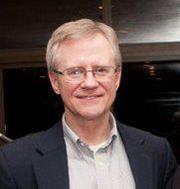Wareham pastor, church tackle poverty with coffee
The First Congregational Church in Wareham is doing its part to alleviate poverty in the third world... one drop of fair-trade coffee at a time.
The church's Interim Reverend Stan Duncan is the founder of the United Church of Christ Coffee Project. The UCC Coffee Project works with Equal Exchange, a fair-trade coffee producer out of West Bridgewater.
The goal of the fair-trade coffee movement is to purchase coffee from farmers at a reasonable price. Many small coffee farmers in Mexico, Central, and South America have been driven into poverty due to prices being driven down.
The church now serves only fair-trade coffee and chocolate at its coffee hours.
“This is an idea I got back in the '90s, and I just kind of stumbled upon Equal Exchange,” Duncan said.
It’s easy to take anything one can buy for 99 cents per cup for granted, but Duncan says that as the project spreads to more churches, the impact is larger.
“This has probably saved more lives and pulled more people out of poverty than any project I’ve done in my life," Duncan said. "It’s almost magical, how easy it is to help people by doing so little.”
Duncan, who says he is also “an economist on the side,” has led numerous Equal Exchange delegations to Mexico and Guatemala to connect with coffee farmers.
“Part of the relationship is they (Equal Exchange) try to do all the processing and packaging in their own factory to cut out the middle people,” Duncan said.
Equal Exchange cuts out the middle man by developing relationships with farmer co-ops.
Duncan says that in Mexico he found “ghost town after ghost town.”
Entire communities abandoned farms as the low price paid for crops forced families to look for work in the cities.
In 2005, Duncan wrote an article for the Zion Herald magazine on the roles of small farms in the international coffee market, which won the Associated Press award for Best Religious Writing.
In it, he wrote that in the early 1990s, the amount of money paid to local farmers started dropping and didn’t stop. The price of coffee in the United States didn’t rise with inflation, causing what Duncan calls in his article, “a catastrophe for farmers."
According to Duncan, one of the reasons for the sudden drop in prices was the decision of the United States to pull out of the International Coffee Agreement after the fall of the Soviet Union. Duncan writes that the agreement kept coffee prices at a relatively stable rate for decades.
Duncan says that while farmers are still struggling, pressure from fair-trade activists has caused some major coffee vendors to change the way they do business.
“There was a campaign in the late '90s and early 2000s to get Starbucks to serve fair-trade coffee,” Duncan explained.
The campaign was successful, and the coffee colossus now serves fair-trade coffee.
Now, parishioners at the First Congregational Church of Wareham have joined the movement by simply changing the brand of coffee they drink.
“The beauty of this is people just drink coffee like they would anyway," Duncan noted.













